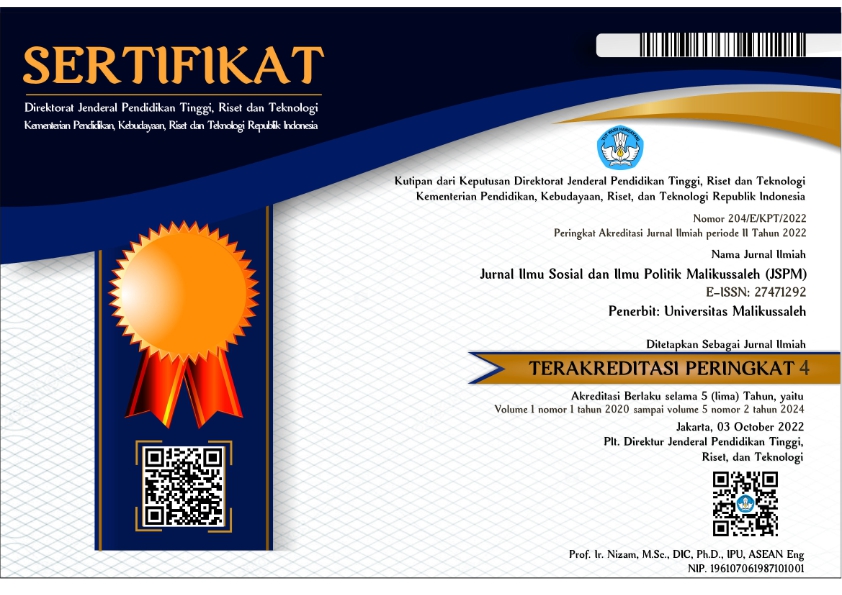Citizen Democracy Studies: A Systematic Literature Review
Abstract
This research aims to find out how democratic citizens develop in the world. The research method applied to this research is a systematic review of literature using 140 scientific articles derived from scope databases. Reviewing articles using the Vosviewer application. The results reveal the concept of the dominance of citizen participation and democratic freedom. But in global democracy, many countries lack democratic principles, leading to erosion and autocracy. Democracy affects public policy through legislative branches, including representative democracy, which affects national security and social justice. In addition, it was found that per analysis of research data carried out from 2022 to 2023 related to the concept of civil democracy in some countries has an upward trend, as the volume of discussion on this topic continues to increase every year. Research results have contributed to the development of research on civil democracy in the world. The limitation of this research is that articles are only used from scope databases so the research findings cannot comprehensively describe issues of citizen democracy. Further research needs to use scientific articles derived from other leading international datasets, such as the Web of Science and Dimensionds Scholars.
Keywords
Full Text:
PDFReferences
Alemayehu, D. (2022). Challenges to The Assumption That Economic Success Could Enhance State Legitimacy in Africa, Ten Years Later. Development (Basingstoke), 65(2–4), 161–177. https://doi.org/10.1057/s41301-022-00348-x
Colomer, L. (2023). Participation and cultural heritage management in Norway. Who, when, and how people participate. International Journal of Cultural Policy. https://doi.org/10.1080/10286632.2023.2265940
Cortez, F. (2023). Artificial Intelligence, Climate Change and Innovative Democratic Governance. European Journal of Risk Regulation, 14(3), 484–503. https://doi.org/10.1017/err.2023.60
Dalton, R. J. (2022). Political Action, Protest, and the Functioning of Democratic Governance. American Behavioral Scientist, 66(4), 533–550. https://doi.org/10.1177/00027642211021624
Dumitru, A. C., Losada-Puente, L., Peralbo, M., Brenlla, J. C., Rebollo-Quintela, N., & García-Fernández, M. (2023). Mapping energy citizenship in the south of Europe. Frontiers in Psychology, 14. https://doi.org/10.3389/fpsyg.2023.1112457
Frimpong, A. N. K., Ping, L., Adu-Gyamfi, S., & Amoah, M. (2022). Sustainable governance: social media and voter realignment, the case of Ghana. International Journal of Technology, Policy and Management, 22(3), 217–246. https://doi.org/10.1504/ijtpm.2022.125256
Gouache, C. (2022). Imagining the future with citizens: participatory foresight and democratic policy design in Marcoussis, France. Policy Design and Practice, 5(1), 66–85. https://doi.org/10.1080/25741292.2021.1930687
Iheanacho, V. U. (2022). The Catholic Church and Prophetic Mission: Transitioning Church-State Relations in Africa. Religions, 13(4). https://doi.org/10.3390/rel13040339
Jaja, T. C., & Aditya, Z. F. (2022). PROMOTING THE GOOD GOVERNANCE BY ADVANCING THE ROLE OF PARLIAMENTARIANS AND THE TERM OFFICES LIMITATION (COMPARING NIGERIA AND INDONESIA). Journal of Indonesian Legal Studies, 7(1), 265–298. https://doi.org/10.15294/jils.v7i1.54776
Jatau, V., & Maza, K. D. (2023). Democracy, Peace, and Religion in Nigeria: Can Religion Be Used to Consolidate or Undermine Democracy and Peace? Religions, 14(10). https://doi.org/10.3390/rel14101305
Jung, S.-M. (2022). Participatory budgeting and government efficiency: evidence from municipal governments in South Korea. International Review of Administrative Sciences, 88(4), 1105–1123. https://doi.org/10.1177/0020852321991208
Karagulyan, E., & Batyreva, M. (2023). A STUDY OF THE AVAILABILITY AND DEMAND OF DIGITAL SERVICES FOR THE MANIFESTATION OF SOCIAL AND POLITICAL ACTIVITY BY CITIZENS. BRICS Law Journal, 10(4), 162–185. https://doi.org/10.21684/2412-2343-2023-10-4-162-185
Kokaj, A., & Sinani, B. (2023). The multi-level governance of the European Union: the role of the local government. Juridical Tribune, 13(1), 32–42. https://doi.org/10.24818/TBJ/2023/13/1.03
Krawatzek, F., & Langbein, J. (2022). Attitudes towards democracy and the market in Belarus: what has changed and why it matters. Post-Soviet Affairs, 38(1–2), 107–124. https://doi.org/10.1080/1060586X.2022.2029034
Kud, A. (2023). Decentralized Information Platforms in Public Governance: Reconstruction of the Modern Democracy or Comfort Blinding? International Journal of Public Administration, 46(3), 195–221. https://doi.org/10.1080/01900692.2021.1993905
Lim, S. B., & Yigitcanlar, T. (2022). Participatory Governance of Smart Cities: Insights from e-Participation of Putrajaya and Petaling Jaya, Malaysia. Smart Cities, 5(1), 71–89. https://doi.org/10.3390/smartcities5010005
Lippert-Rasmussen, K. (2023). Vote markets, democracy and relational egalitarianism. Economics and Philosophy, 39(3), 373–394. https://doi.org/10.1017/S0266267122000220
Liu, Y., Wang, L., & Ye, M. (2023). Public participation in democracy, local accountability and happiness: Evidence from rural China. Governance, 36(4), 1225–1245. https://doi.org/10.1111/gove.12738
Melgar, F. C., Herrera, A. L. R., Castro, E. A. G., Vargas, M. I. R., & Umaña, M. R. (2022). Participation and governance in the urban planning of Acapulco. Regions and Cohesion, 12(3), 110–133. https://doi.org/10.3167/reco.2022.120306
Osterberg-Kaufmann, N., & Teo, K. K. (2022). Uncoupling Conceptual Understandings and Political Preferences: A Study of Democratic Attitudes among Singapore’s Highly Educated Young People. Pacific Affairs, 95(3), 497–526. https://doi.org/10.5509/2022953497
Pungas, L. (2023). Dachas and food democracy—What makes a (good) food citizen? Frontiers in Sustainable Food Systems, 7. https://doi.org/10.3389/fsufs.2023.1052298
Qin, Y. (2023). Grassroots governance and social development: theoretical and comparative legal aspects. Humanities and Social Sciences Communications, 10(1). https://doi.org/10.1057/s41599-023-01830-8
Stratu-Strelet, D., Gil-Gómez, H., Oltra-Badenes, R., & Guerola-Navarro, V. (2023). Exploring the links between democracy and digital transformation in developing Latin America countries: Building a democracy consolidation theory. Technological Forecasting and Social Change, 195. https://doi.org/10.1016/j.techfore.2023.122742
Tresiana, N., Duadji, N., & Damayantie, A. (2023). Deliberative Democracy Innovations at Citizen Level: Challenges of Local Government in Indonesia. Lex Localis, 21(4), 807–832. https://doi.org/10.4335/21.4.807-832(2023)
Wuttke, A., Gavras, K., & Schoen, H. (2022). Have Europeans Grown Tired of Democracy? New Evidence from Eighteen Consolidated Democracies, 1981-2018. British Journal of Political Science, 52(1), 416–428. https://doi.org/10.1017/S0007123420000149
Zimbalist, Z. (2022). How electoral competition shapes local public goods provision in South Africa. Democratization, 29(2), 253–275. https://doi.org/10.1080/13510347.2021.1952991
DOI: https://doi.org/10.29103/jspm.v5i2.16008
 Article Metrics
Article Metrics
 Abstract Views : 224 times
Abstract Views : 224 times
Refbacks
- There are currently no refbacks.
Copyright (c) 2024 Ataya Qonita Ananta, Salahudin Salahudin, Muhammad Firdaus

This work is licensed under a Creative Commons Attribution-ShareAlike 4.0 International License.
INDEXED BY:




.png)









Redaksi Jurnal Ilmu Sosial dan Ilmu Politik Malikussaleh (JSPM): Gedung Fakultas Ilmu Sosial dan Ilmu Politik Universitas Malikussaleh. Kampus Bukit Indah Jln. Sumatera No.8, Kec. Muara Satu Kota Lhokseumawe, Prov. Aceh, Indonesia. eMail: jspm@unimal.ac.id

This work is licensed under a Creative Commons Attribution-NonCommercial-ShareAlike 4.0 International License



.png)



